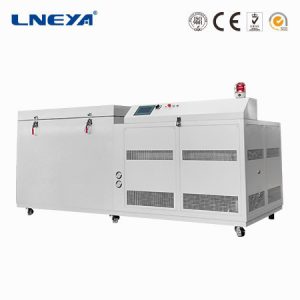Which reactions need temperature control in the process of chemical and pharmaceutical production?
Precise temperature control plays a crucial role in the reaction process during synthesis/crystallization in the production of chemical and pharmaceutical products. In the field of fine chemicals, many chemical reaction processes and crystallization processes are carried out in a low temperature environment. When the reaction is carried out in a low temperature environment, the amount of impurities produced is obviously reduced, and the purity of the product is increased, so that the reacted product has a high selectivity. Compared with the traditional process technology, a reasonable selection of the working temperature range can improve product quality and synthesis quality, improve production efficiency and reduce production costs. The premise of realizing all this is the control of the dynamic temperature in the reaction process. In the crystallization process of pure product, in order to obtain higher product quality, it is necessary to strictly follow the specified cooling rate.
Decarboxylation is a chemical reaction that removes a carboxyl group and releases carbon dioxide (CO2) and replaces it with hydrogen atoms. The term refers to the states of reactants and products. Decarboxylation is one of the oldest known organic reactions because it usually requires simple pyrolysis and distillation of volatile products from the reactor. Heating is required because the reaction is less favorable at low temperatures. Yield is highly sensitive to conditions. For example, the temperature required for the polar activated decarboxylation reaction method is as high as 140 °C.
Winterization is one of the methods of crystallization separation. It is to stir the oil slowly, control the cooling speed, and cool it to about 4~6 ℃. The solid fat is formed into larger crystals and separated out. Winterized oil is characterized by passing the freezing test, that is, it is not cloudy after 5.5 hours at 0 °C. Another example is that the whole process of enzyme extraction is kept at low temperature because enzymes are proteins. Proteins are denatured at high temperatures, thereby losing their activity. The temperature is too low, which is not conducive to the extraction operation. So careful temperature management in the processing plant not only ensures high extraction rates, but also efficient recovery of the solvent used. It is conceivable that temperature control plays a decisive role in the extraction process.
Our LNEYA temperature control system equipment can be used to accurately control temperature in small laboratory rotary evaporators to large factory pilot systems. Temperature control range -120℃~350℃, efficient production stability and repeatable results, refrigeration power from 0.5~1200kW. Superior performance, high precision plus or minus 0.1 ℃, high intelligent temperature control settings, 7-inch 10-inch color TFT touch screen graphic display.
Related recommendations
-
What is the role of the reactor refrigeration and heating circulator? How to choose?
1590The refrigeration and heating circulator is a device that can provide precise temperature control for the reactor. It can realize heating and cooling functions at the same time. It is suitable for chemical reaction processes that require p...
View details -
Application area of high temperature refrigeration and cooling control system
1443The high-temperature refrigeration and cooling control system is used for supporting glass reactors, rotary evaporators, fermentation tanks, and calorimeters; widely used in petroleum, chemical, metallurgical, biochemical, physics, testing and che...
View details -
The reason for the existence of cryogenic refrigerator in the tool parts manufacturing industry
1346Cryogenic treatment is applied to worn tools, die cutter materials, and later extended to alloy steel, cemented carbide, etc., this method can change the internal structure of metal materials, thereby improving the mechanical and processing proper...
View details -
Refrigeration Principle Of Low Temperature Chiller
1369The refrigeration principle of the so-called low temperature chiller is to use the artificial method, compressor refrigeration, through energy consumption, in a cycle process, in the process that cooling materials take away the heat. Generally spe...
View details
 LNEYA Industrial Chillers Manufacturer Supplier
LNEYA Industrial Chillers Manufacturer Supplier












